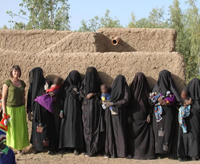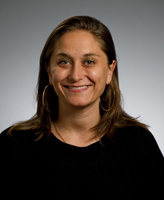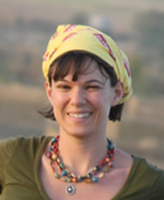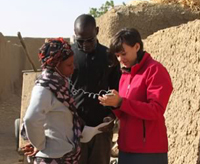From the beginning of their joint research on political participation in rural Mali, Notre Dame political scientist Jaimie Bleck and Kellogg Institute for International Studies Visiting Fellow Kristin Michelitch were interested in the voices of voiceless citizens.
Mali had experienced two decades of democratic rule but mass illiteracy, gender inequality, and elite control of political knowledge meant that many rural citizens, especially women, had little real role in the political process.

“Many people don’t speak the language of politics, which limits their engagement with the state,” says Bleck, a Kellogg Institute faculty fellow and Ford Family Assistant Professor of Political Science. Even more fundamentally, villagers do not have enough independent knowledge of national politics to express opinions with peers.
“Traditional elites in rural Islamic Africa, such as village chiefs and imams, act as information gatekeepers,” explains Michelitch. “They can dictate or influence villagers’ opinions and behaviors, leading to village block-voting in elections.”
For Bleck and Michelitch, such practices raised questions about marginalized citizens’ political autonomy as well as their ability to improve their economic well-being.
A well-laid plan
 Jaimie Bleck
Jaimie Bleck
In 2011, Bleck, who had just joined Notre Dame’s Department of Political Science, and Michelitch, then a Ph.D. candidate at New York University (NYU), put together an ambitious research proposal—“Good Morning Timbuktu! The Impact of Radio in Rural Islamic Africa.”
The project garnered a Kellogg Institute research grant, significant outside funding, and honorable mention in the 2011 competition for the Carrie Chapman Catt Prize for Research on Women and Politics at Iowa State University.
The pair, who met in Ghana in 2009, planned a randomized controlled trial to explore whether access to information via radio would help citizens—especially women and low-status men—participate more independently in the democratic process. USAID donated solar radios, computers, and the i-Touches that a team of local research assistants would use for interviews.
In keeping with the project’s participatory approach, listening to local voices was key to fine-tuning the research plan.
“We went to the experts,” Bleck says, describing the October 2011 pilot study the two researchers devised. Bleck visited villages not included in the trial to get advice about how to encourage women to participate and how, in a patriarchal culture, to ensure they would be able to retain the radios they would receive as part of the experiment.
It made perfect sense to combine Bleck’s interest in innovative methods and deep knowledge of the region, where she has spent 11 years conducting research, with Michelitch’s focus on methodological expertise and African development.
 Kristin Michelitch
Kristin Michelitch
“Kristin is one of the best out there in coming up with creative ways to measure behavior in the field,” says Bleck, who encouraged Michelitch to apply for a Kellogg visiting fellowship to enhance the collaboration.
They conducted an initial wave of research in 10 villages in January 2012. Half the villages were “treated,” meaning that women and low-status men received solar-powered radios that should give them direct access to political information. (The same groups in “control” villages received flashlights.)
Bleck and Michelitch planned to follow up after the April 2012 national election with two more rounds of surveys to determine the effect of the radio distribution on voting.
Villages under study become “contested territory”
But sometimes researchers’ best-laid plans are turned upside down by circumstances almost no one would have anticipated.
In March 2012 a military coup overturned Mali’s democratically elected government. In short order, the country’s northern provinces were taken over by Tuareg secessionists and then by Islamist rebels, including Al Qaeda of the Islamic Maghreb.
The rural villages where Bleck and Michelitch were conducting their study were not directly involved in fighting but were “contested territory” on the border of rebel-held areas. No elections would take place.
However, the research would go on.

“We turned our attention to how access to radio has affected people’s political views in a time of incredible upheaval,” Michelitch says.
In summer 2012, the team conducted two more waves of research in the 10 villages, including a survey of more than 600 respondents, interviews with village leaders, same-gender focus groups, spousal interviews, and content analysis of radio programs.
With data from before and after the transition between regimes and the ongoing rebellion, they now aim to measure the effect of access to information on citizenship in the context of unprecedented political uncertainty.
“If anything, political information became even more important,” says Bleck. “While the world focused on Mali’s political crises, our research found that most rural Malians were more concerned with the humanitarian and infrastructure challenges they face every day in living through extreme drought and famine.”
As Bleck and Michelitch described in a post on the influential political science blog The Monkey Cage (January 2013), villagers weighed in on topics such as the importance of restoring democracy before retaking the north; whether it would be worth fighting a war to reunify the country; and what they felt was the country’s most important policy issue.
“When villagers were asked what they would prioritize if they were president of Mali two months before the coup, 51 percent of respondents cited human development issues like health, education, agriculture, and water as their priority as president, while 9 percent mentioned peace and security,” they wrote.
Following the coup and the insurgency, villagers prioritizing peace and security rose to 14 percent but those mentioning human development issues rose even more, to 67 percent.
The overwhelming majority of respondents who took advantage of the opportunity to record messages to President Obama requested humanitarian relief and basic infrastructure rather than aid in resolving either of the ongoing political crises.
“President Obama, here we are hungry. We want you to bring us food,” said one such message. “The rebels tire us a lot, our goats, our cattle can no longer be brought to graze in the North because they risk being stolen. Do your best to quickly help us.” (See all 531 messages here.)
Getting the word out—academic and policy dissemination
In March 2013, Bleck and Michelitch were back in Mali, discussing their preliminary results and possible next steps with their research team. The trial is part of a larger effort to understand democratization and development in Islamic Africa.
While still analyzing their data, the two can say with confidence that people given access to radios do acquire and share new information and substantive political opinions—both skills vital to active citizenship. Women are less likely to automatically adopt elite opinions—and men are less decisive in their opinions overall. In addition, radio seems to increase the importance of national over ethnic identity.
The collaborators have presented their preliminary results to the Kellogg Institute, the African Studies Association, and NYU Abu Dhabi, with more conference presentations set for coming months. They plan multiple journal articles on elements of the project.

“In addition to our academic work, we have been actively communicating with the policy community,” says Bleck, who presented their early findings at a State Department meeting in October. “Our Monkey Cage post was widely distributed to policymakers and cited by pundits.”
The post also led to a consultancy with the World Bank on mixed-method research in fragile states. Following France’s military intervention in Mali, Bleck was interviewed by Radio France International (RFI).
“Villagers would characterize the situation as the people in power creating a state of political gridlock,” she told RFI’s approximately 22 million listeners.
“If people in the capital are fighting among themselves, no one can move forward to meet the needs these people are identifying as critical… creating peace and security, but then trying to tackle things such as health, infrastructure, and roads.”
Both Bleck and Michelitch are gratified that they have been able to help amplify the voices of residents of rural Mali in a time of political and environmental crisis.
“The most exciting projects are those that successfully marry the worlds of academia and policy,” says Michelitch, who starts as assistant professor of political science at Vanderbilt University in the fall.
Bleck agrees. “We certainly hope that our findings can contribute to development in Mali,” she says.
Learn More >
- Department of Political Science
- Kellogg Institute for International Studies
- Jaimie Bleck faculty page
- Kristin Michelitch visiting fellow page
- Related blog post on Monkey Cage
- Jaimie Bleck website
Originally published at kellogg.nd.edu
Originally published by at al.nd.edu on April 18, 2013.